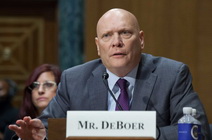With millions of workforce and low-income Americans facing a lack of affordable housing, a group of nine bipartisan Senators recently introduced legislation that would create a task force focused on policy recommendations to address the nation's housing scarcity problem. (Sen. Heller News Release, July 18)
 |
With millions of workforce and low-income Americans facing a lack of affordable housing, a group of nine bipartisan Senators recently introduced legislation that would create a task force focused on policy recommendations to address the nation's housing scarcity problem. (Sen. Heller News Release, July 18) |
- The Task Force on the Impact of the Affordable Housing Crisis Act – introduced by Senators Dean Heller (R-NV), Todd Young (R-IN), Maria Cantwell (D-WA), Angus King (I-ME), Tim Kaine (D-VA), Doug Jones (D-AL), Cory Gardner (R-CO), Marco Rubio (R-FL), and Chris Coons (D-DE) – would create an 18-member Task Force with two co-chairs. The affordable housing task force would evaluate and quantify the impact of housing costs on other government programs and provide recommendations to Congress on how to increase affordable housing. (One-page Task Force Overview)
- Sen. Heller commented, "While we welcome (an) explosion of growth and the jobs and economic opportunities that come with it, there is a lack of affordable housing because the demand for it is outpacing the supply. We need to develop solutions."
- Sen. Cantwell noted, "This year we were able to boost the Low Income Housing Tax Credit, which has built 90 percent of affordable housing in our country. More needs to be done to get to the root causes of the affordable housing crisis and show that the LIHTC is cost-effective and creates jobs."
- Sen. Cantwell discussed the shortage of housing for workforce and low-income Americans with Roundtable President and CEO Jeffrey DeBoer last year during a Senate Finance Committee hearing on business tax reform. (Hearing Video Clip, Sept. 19, 2017)
 |
Roundtable President and CEO Jeffrey DeBoer testified before the Senate Finance Committee: "And we need to focus on ways to incentivize affordable housing, not just low-income housing, which is obviously needed, but workforce housing as well ... it is certainly a growing and troubling problem. And as we go forward, that part of our nation has to be included in whatever is done in economic growth." (Hearing Video Clip, Sept. 19, 2017) |
- In response to a question from Sen. Cantwell, DeBoer said, "Most businesspeople that operate certainly in urban areas recognize that there's a tremendous and growing shortage of what we would call workforce housing. And so people that are middle-American citizens, firemen, teachers, what have you, combined incomes, working very, very hard, are being priced out of our nation's cities."
- DeBoer continued, "And we need to focus on ways to incentivize affordable housing, not just low-income housing, which is obviously needed, but workforce housing as well ... it is certainly a growing and troubling problem. And as we go forward, that part of our nation has to be included in whatever is done in economic growth." (Hearing Video Clip, Sept. 19, 2017)
- Housing in the nation's economically distressed communities could also benefit from the new federal "Opportunity Zones" program, which seeks to encourage investment, economic development, and job creation in low-income areas. Opportunity Zones are the focus of a July 16 GlobeSt.com interview with Real Estate Roundtable President & CEO Jeffrey DeBoer and Roundtable SVP and Counsel Ryan McCormick. With implementation guidance about the program expected soon from the U.S. Department of the Treasury, the article highlights major tax considerations and regulatory questions, which are also discussed in greater detail in a Roundtable June 28 Opportunity Zone comment letter. (Roundtable Weekly, July 20). Treasury rules are expected to confirm that Opportunity Zone tax benefits extend to the construction and rehabilitation of affordable housing.
The Roundtable's 2018 Policy Agenda, released in February, recognizes the affordable housing challenge – "As many of our nation's urban areas become more expensive, our industry continues to recognize and support housing not only for lower income residents, but also for the nation's middle income workforce. A stable, healthy commercial and residential real estate economy facilitated by sensible federal policies can continue to improve our national standard of living." (Introduction, 2018 Roundtable Policy Agenda)

